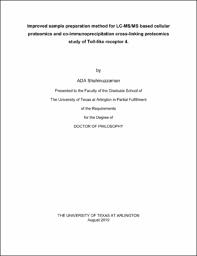
ATTENTION: The works hosted here are being migrated to a new repository that will consolidate resources, improve discoverability, and better show UTA's research impact on the global community. We will update authors as the migration progresses. Please see MavMatrix for more information.
Show simple item record
| dc.contributor.advisor | Chowdhury, Saiful M. | |
| dc.creator | Shahinuzzaman, A.D.A | |
| dc.date.accessioned | 2020-08-04T17:30:52Z | |
| dc.date.available | 2020-08-04T17:30:52Z | |
| dc.date.created | 2019-08 | |
| dc.date.issued | 2019-08-02 | |
| dc.date.submitted | August 2019 | |
| dc.identifier.uri | http://hdl.handle.net/10106/29308 | |
| dc.description.abstract | Mass spectrometry-based methods are now widely practiced in large-scale proteomics studies. Unfortunately, sample loss in proteomics hinders complex analysis in proteomics, and immune precipitation (IP) mass spectrometry-based proteomics is getting popular in studying comprehensive signaling pathways. To contribute to these demanding research areas, I have completed two experimental projects in this thesis.
In our first project, we developed a sample preparation method to identify proteins from detergent-containing cell lysate samples efficiently. Methanol-chloroform purification is an essential step in LC-MS/MS based cellular proteomics experiments since it removes salts and detergents from the sample. The cell lysis buffer contains a high concentration of detergents. Hence, proteins with large hydrophobic domains can remain dissolved in the lysis buffer after cell lysis. However, after methanol-chloroform purification, solubilization of the precipitated proteins back to the solution in the absence of detergents is difficult. Through a BCA protein quantification assay, we have seen that around two-thirds of the weight of protein become insoluble after methanol-chloroform purification. Thus, we decided to use a phase transfer surfactant, deoxycholic acid (DCA) to improve re-solubilization and protein identification after tryptic digestion. We took mouse macrophage cell lysates and performed methanol-chloroform purification followed by reconstitution in the presence of deoxycholic acid (DCA). Upon mass spectrometric analysis, for this modified method, we observed a higher number of identified proteins compared to the unmodified method. This trend was observed further when equal amounts of precipitated and resolubilized proteins from modified and unmodified methods were tryptic digested and analyzed in high-resolution mass spectrometry with an increase of 14% in protein identification with this new method. Additionally, we compared this modified sample preparation method with other popular methods in bottom-up proteomics analysis, and we conclusively confirmed that this proposed method identifies the highest number of proteins for proteomics sample preparation. Our method solves the bottleneck of re-solubilizing methanol-chloroform precipitated proteomics for any large-scale proteomics analysis where methanol-chloroform purification and in-solution digestion are required.
Additionally, in my second project, I worked to understand the immune signaling through Toll-like receptor 4 (TLR-4). Toll-like receptors are essential immune sensors of the innate immune mechanism. They are transmembrane receptors on immune cells and organelle surfaces. Toll-like receptor 4 (TLR4) is a highly expressed receptor on immune cells and can get activated through both exogenous bacterial infections and endogenous damage signaling molecules. Here, we used a co-immunoprecipitation (IP) based cross-linking proteomics and label-free quantitation approach to reveal the TLR-4 interactome in the presence of Statin and LPS, alone or in combination on HA-TLR4 transfected HEK293 cells. A total of 712 differentially expressed proteins were identified and quantified in this study. I selected two candidate proteins from cross-linking proteomics data. Using biochemical validation through immunoblotting, we confirmed macrophage myristoylated alanine-rich C kinase substrate (MacMARCKS) as a member in TLR4 specific immune signaling network.
I believe these two studies contribute significantly in sample preparations and signaling-pathway analysis by mass spectrometry. | |
| dc.format.mimetype | application/pdf | |
| dc.language.iso | en_US | |
| dc.subject | Mass spectrometry | |
| dc.subject | Proteomics | |
| dc.subject | Protein purification methods | |
| dc.subject | Toll-like receptor 4 | |
| dc.subject | TLR4 | |
| dc.subject | Co-immunoprecipitation | |
| dc.subject | Deoxycholic acid | |
| dc.title | Improved sample preparation method for LC-MS/MS based cellular proteomics and co-immunoprecipitation cross-linking proteomics study of Toll-like receptor 4 | |
| dc.type | Thesis | |
| dc.degree.department | Chemistry and Biochemistry | |
| dc.degree.name | Doctor of Philosophy in Chemistry | |
| dc.date.updated | 2020-08-04T17:30:55Z | |
| thesis.degree.department | Chemistry and Biochemistry | |
| thesis.degree.grantor | The University of Texas at Arlington | |
| thesis.degree.level | Doctoral | |
| thesis.degree.name | Doctor of Philosophy in Chemistry | |
| dc.type.material | text | |
| dc.creator.orcid | 0000-0003-0922-3326 | |
Files in this item
- Name:
- SHAHINUZZAMAN-DISSERTATION-2019.pdf
- Size:
- 6.164Mb
- Format:
- PDF
This item appears in the following Collection(s)
Show simple item record


